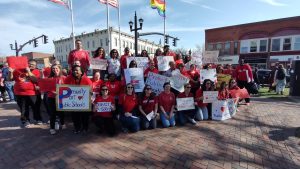Oberlin Should Continue Undivided
April 5, 2013
The ceremony in Finney Chapel just a month ago was about as stirring as could be. The program was perhaps occasioned by more than a month-long series of racist, homophobic, anti- Semitic, cowardly acts, etc., that became even more inflamed by the reported sighting of someone well after midnight in KKK regalia. That any of this may have happened at any college in America in the 21st century with our first black president would be unfortunate; that some or all of these incidents occurred at Oberlin College is certainly ironic, all the more because of how liberal and welcoming the city is, with its countless special and loving citizens.
There are at least twenty or more colleges — Harvard, Yale and Stanford, for example — where the academic standards are just as high as Oberlin’s. But there is surely none in America nor anywhere else in the world that can boast, as Oberlin surely can, of possessing both the highest academic and artistic standards and, simultaneously, by any barometer, embracing with pride the commitment to and support of a more just, humane and peaceful world. We all know that Oberlin College was the first to open its doors to women and one of the first to admit blacks; yes, that was in the 19th century and does not alone offer evidence as to just how special and distinctive Oberlin College is today.
A fleeting outline of what makes Oberlin the leading bulwark of liberalism, opportunity and optimism includes our offering the William L. Robinson Scholarship to all children, including black, who spend all four years at Oberlin High School and get admitted to Oberlin College, a gift worth over $200,000 per child. Now that’s a lot of money even in an era when there are black athletes earning millions of dollars a year and Tiger Woods sometimes pocketing $1.5 million for just four days of work. One can only imagine what our enslaved ancestors Denmark Vesey, Harriet Tubman or Frederick Douglass would have thought, or even DuBois, Malcolm X or Dr. King, about blacks’ opportunities to get an education. And to get young black children and all children prepared for Oberlin College, the College offers 24/7, free tutorial help during the school year and all summer long, especially in physics, chemistry, mathematics, biology, etc.
Oberlin College’s Africana Studies department, today chaired by Professor Meredith Gadsby, is a remarkably thriving and influential department, rivaling in its number of faculty members that of colleges or universities which are much larger. Her passionate and courageous leadership reflects the insight, perseverance and intellectualism of Professors Yakubu Saaka (late), Calvin Hernton (late), Adrienne Lash Jones and James Millette over the past thirty years, with all earning immense admiration for their willingness and ability to be the torch-bearers for a more progressive, responsive and socially conscious Oberlin College.
A few may believe that Oberlin College is either a perfect institution or an almost perfect place, particularly when one stares at the edifice recently constructed principally for the Jazz Department. The founder and inspirational soul of the Jazz Department, the late Professor Wendell Logan, lived to behold that awesome sight. But neither he, Hernton nor Saaka ever thought for a moment that Oberlin College was a perfect place; they witnessed racism, bigotry, sexism, etc. Yet anyone who knew them at all knew that they were all consumed by a very palpable certainty that they themselves were empowered to triumph over obstacles and use the humane spirit, goodwill and optimism embedded in the institution to help keep Oberlin in first place. They surely succeeded marvelously and left us in a most enviable position.
I think we must continue to build upon our proudest shared Oberlin College heritage of making sure that our students in the College or Conservatory are the world’s best prepared young people to advance the cause of a more just, humane and peaceful world. In spite of our imperfections, we can best help them achieve this goal by, first and foremost, guaranteeing that they feel and are physically and emotionally safe and that they witness faculty, staff and administrators working most closely, amicably and respectfully to ensure the peace and tranquility they need to excel as scholars and artists.
The goals of enrolling more black students, providing them with the resources to excel and employing blacks in the Conservatory and College are likely to make for good and spirited dis- cussions. Moreover, attaining the goal of a richer and more dynamically diverse student body is more likely to be achieved in an atmosphere where there are softer and more respectful voices informed by a desire to succeed. Additionally, there can and must be debates about the views our enslaved ancestors would have had about the wisdom of cancelling classes and student performances when there is no evidence of any kind of physical or psychological threat pertaining to those classes; and there definitely must be the most serious discussions about the expected consequences for anyone contemplating physically preventing others from attending classes. But, as a general rule, one must weigh carefully the value of students witnessing routinely hostile contentiousness among administrators, staff and faculty.
I am very proud of the administrators, faculty and staff and grateful for their unselfishness to serve and give of themselves in the most trying circumstances. Along with many sensitive and concerned students, they are working tirelessly to ensure that the misguided, thoughtless and hurtful acts of perhaps just two or three students out of almost 3,000 do not divide us. Our sole focus and goal at Oberlin College must continue to be the preeminent college where the most sparkling beacon of hope for embracing and celebrating all human beings towers above. Celebrate this day.
—Booker Peek
Professor emeritus, African American Studies


















